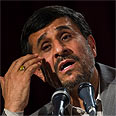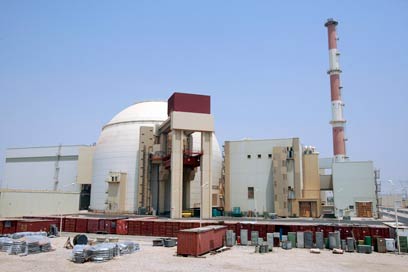
Diplomats: Iran not breaking int'l law
Despite world powers' concerns that Tehran is expanding atomic capability, diplomats say there is no evidence it's building nuclear weapons
Six former European diplomats claimed Thursday that despite the West's concerns over Iran's seemingly growing nuclear capabilities, there is no tangible proof that the Islamic Republic is pursuing nuclear weapons.
This somewhat puzzling statement was the conclusion of an article in the British Guardian, co-authored by Richard Dalton and five other former ambassadors to Iran: Germany's Paul von Maltzahn, Sweden's Steen Hohwü-Christensen, Guillaume Metten (Belgium), François Nicoullaud (France) and Italy's Roberto Toscano.
- Receive Ynetnews updates directly to your desktop
In an article, the six say that Iran is not in violation of any international laws and that it is the West's strategy that has helped create the conflict with Tehran.
The international debate regarding Iran's continued failure to heed UN decisions, is ongoing "and a new report by the International Atomic Energy Agency rightly draws attention to the questions Iran has not answered about experiments it has made on nuclear bomb technology," the article said.
"As ambassadors to Iran during the past decade, we have all followed closely the development of this crisis. It is unacceptable that the talks have been deadlocked for such a long time.
"The Arab world and the Middle East are entering a new epoch in which no country is immune from change. The Islamic Republic of Iran faces the disaffection of a significant part of its population, and this period of uncertainty offers opportunities to reconsider the west's established position on the nuclear question," continued the piece.

Bushehr nuclear power plant (Photo: AFP)
In terms of international law, they add, the United States and Europe's sanctions "embody in a set of security council resolutions authorizing coercive measures in case of 'threats to the peace.'
"But what constitutes the threat? Is it the enrichment of uranium in Iranian centrifuges? This is certainly a sensitive activity, in a highly sensitive region.
"The international community's concerns are legitimate and Iran has a moral duty to answer them," the article continues.
"In principle, however, nothing in international law or in the non-proliferation treaty forbids uranium enrichment. Several other countries, parties or not to the treaty, enrich uranium without being accused of 'threatening the peace.' And in Iran, this activity is submitted to inspections by the IAEA inspections."
The IAEA has never uncovered any attempted diversion of nuclear material to military use, the article states.
"Most experts, even in Israel, view Iran as striving to become technically able to produce a nuclear weapon but abstaining from doing so for now – and again, nothing in international law forbids this ambition," the six asserted.
"Some may ask why we should offer the Iranian regime an opening that may help to restore its internal and international legitimacy… It's a legitimate question, but we shouldn't overestimate the influence of nuclear negotiation on internal developments in Iran.
"The failure of the last round of negotiation in January shows that the current deadlock will be difficult to break," the article predicts.
"The next step should be for the two sides in this conflict to ask the IAEA what additional tools it needs to monitor Iran's nuclear program fully, and to provide credible assurances that all its connected activities are purely peaceful. The agency's answer would offer a basis for the next round of pragmatic negotiations."
Dudi Cohen contributed to this report
- Follow Ynetnews on Facebook










